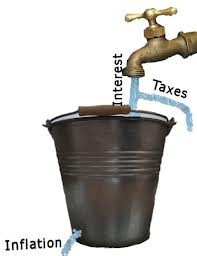Inflation is one of the major reason for rebalancing your investment portfolios. Consider last few years, where it has been the cause of all happenings in your life. From manifold rise in EMIs and household budgets to financial instruments delivering higher interest to investors, it has ensured you think more about it. Most economist track this one factor because it impacts countries economy. Although a mild inflation is always welcomed, the concern increases when it goes almost out of control. It then starts jeopardizing the savings and investments as the currency of the country gets impacted. That’s when most Central Banks like RBI in India and government take measures to bring it under control. These measures are linked to different markets where your investments will be lying and so it forces you to review and take appropriate actions.
How Inflation Impact your Investments?
Before we go to highlight what should be done when inflation is moving either side, it’s important to understand how inflation impact your investments and what are the areas which requires consideration in current scenario.
The return you earn on any investments also gets impacted by inflation directly. If inflation is too high then the net returns will fall drastically when it is taken in consideration. For e.g. if a fixed deposit is offering interest rate of 7% and inflation is 6% then what you earn is only 1%. Add the taxability of this return; you might be losing money instead of earning. Hence, inflation eats out earnings on investments which impact your goal achievement and you have to look for avenues which can generate returns over and above inflation.

However, inflation moving high or low also provides opportunities as the measures taken by central bank impact various fixed income securities. Some of these have a direct relation while some of them behave inversely to the inflation movement. Due to this in both the scenarios you have options which can generate positive returns while factoring in inflation.
Why Rebalancing is Required?
Fixed income segment gets most impacted by movement in inflation. The bond yields and prices of fixed income securities, both have a relation with interest rate movement which results from RBI decisions to control inflation. The yields are directly related while the bond prices have an inverse relation. So when RBI, to control inflation, increases interest rate through Repos the rates of the bonds too have to be aligned with it in order to attract new investors. This is primarily because old bonds now carry lower interest rates which will not find favor with investors. That’s what has happened in last few years when interest rate was rising and along with it the interest rates on bank fixed deposits, NCDs, Small savings Schemes and other fixed income options was enhancing. Where banks offered 9% to its depositors, corporates launched NCDs with rates hovering around 11-12%.Debt mutual funds like ultrashort term and liquid funds which invest in short term fixed income securities delivered higher returns, averaging 9% than normally 4-5%, to investors. Many took the opportunity by moving to their investments to these categories. On other side prices of long term securities such as government securities or corporate bonds which are traded, declined with rise in interest rates making long term debt funds unattractive. The reverse happens when RBI starts lowering interest rates as inflation eases down. The interest rates on securities decreases but bond prices start increasing as older securities with higher interest rates becomes attractive. So fixed deposit, NCDs and returns on short term debt mutual funds takes a dip making it unattractive for investors. With small savings schemes aligned to g-sec rates now even they will see lower returns during this period. The impact can be seen in tax free bonds where interest rates have already reduced to 7-7.5% from 8% plus offered last year. Banks are reducing FD rates with every measure RBI is taking to reduce rates. On other hand return from gilt and income funds which holds long term securities have started rising with every drop in yield.
It’s not only fixed income market but even the equity market is impacted by inflation. When inflation is moving upwards the cost of borrowing for companies becomes higher. Companies which are poorly managed gets impacted as they are unable to sustain their business but companies which are managed well are able to pass on this increase to the consumer and survive in this scenario. The stocks of these companies may take a short term beating but in the long run they are able to deliver good returns to investors.
All these situations points towards reviewing your investment portfolio and rebalancing it whenever there is a change in such scenario.
Rebalancing Strategy
Movement of interest rates with inflation throws up good opportunities in the fixed income segment. In last few years investors have benefited through higher rates in fixed deposits, NCDs and higher returns from short term debt mutual funds. Although the difference in real returns (Inflation adjusted return) may not be too high when returns are considered with rise in inflation, it has helped in generating positive returns.
Now expectations have been build up that inflation is going to move down in future which will force RBI to take measures of reducing interest rates. So what should investors do with their investment portfolio?
The investments which have been done for long term goals i.e. 10-15 years will not require a huge shift unless asset allocation has been changed. Long term options like EPF or PPF will pay off the desired results. But where investment horizon is 3-5 years and lower, the shift in allocation will be needed since future investments in same category will carry reinvestment risk.
1. Fixed Income Portfolio– The returns from fixed income will come down and so the returns from your debt portfolio. The money you invested in FDs and FMPs which are coming to maturity will have to be considered for reinvestment if you do not need funds. Similarly, the returns from short term debt funds generated in last few years will not be repeated as the interest rates start moving downwards with central bank measures. So your fixed income portfolio will need a review to search for the right options. If you have been able to lock-in your investment with higher fixed rates then you will benefit. At this juncture long term debt funds i.e. Gilt and Income funds have become more attractive. The option is considerable if you have a slightly higher risk appetite and horizon of 2-3 years. Avoid exposing to this category if liquidity is a concern as it has its inherent risk. But even if you have lower risk appetite 10-15% of your debt portfolio should be moved towards these categories to negate impact of lower returns in the future.
2. Equity Portfolio– It is for long term wealth creation and so not much should be done even if you have these short term opportunities arising in debt market. The rebalancing here should be more linked to your financial goals. However, if you are invested in direct equities, then you should have a relook at companies you are holding. As highlighted, poorly managed companies are the most affected by rise in inflation. The inflation may become a good reason to evaluate your portfolio and exiting stocks of such companies if you have a long list. It may also be an ideal option of moving such assets to long term debt funds to derive benefit from the opportunity.
Rebalancing your investments is important to not only identify underperformers or change in allocation but also to benefit from the opportunities which such scenarios provide. However, the strategy shouldn’t rest only on the return parameters but should be planned with your goals and other factors like taxation in consideration.
Leave a Reply